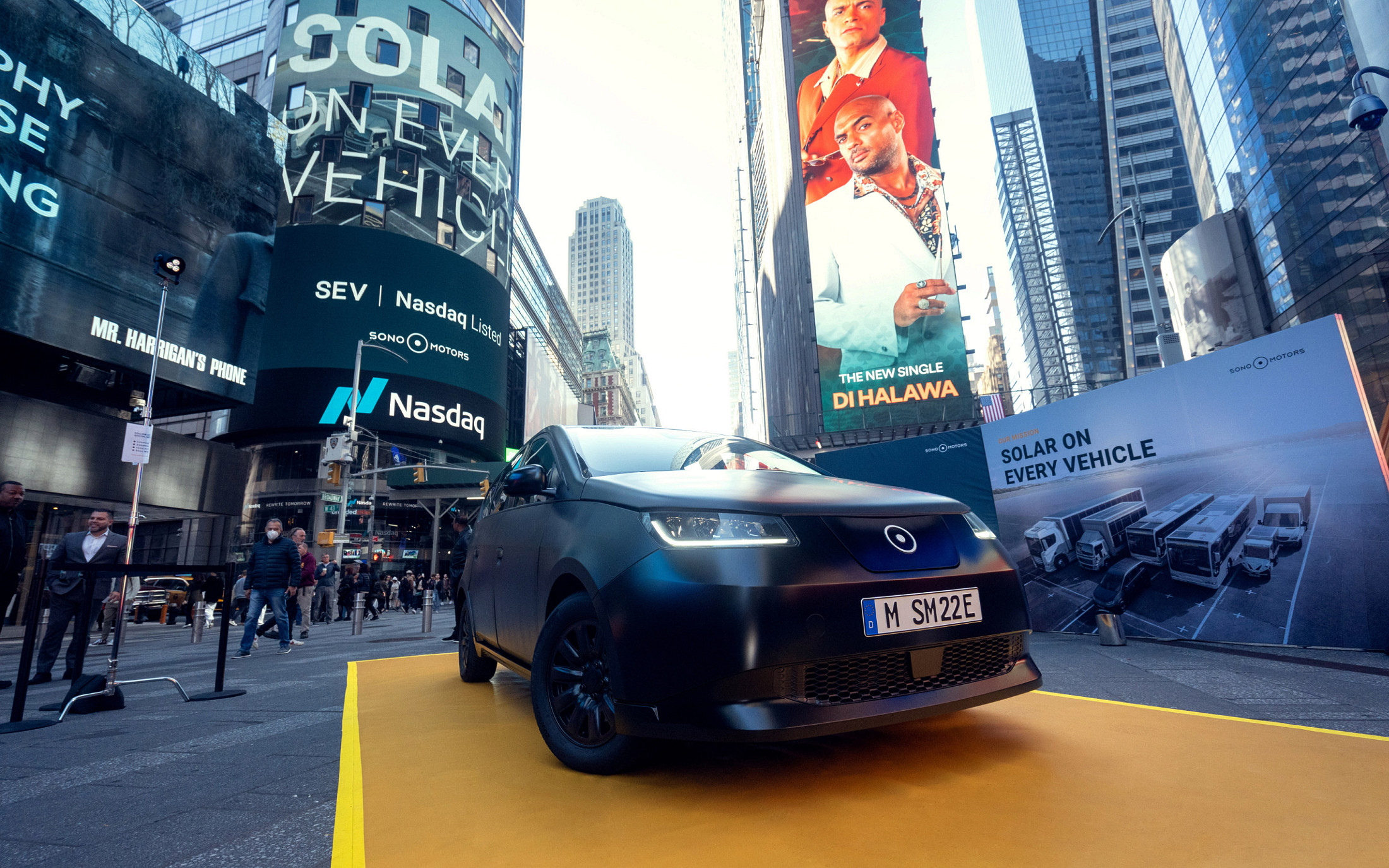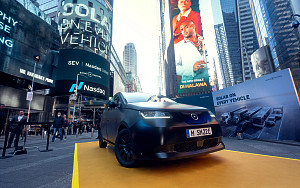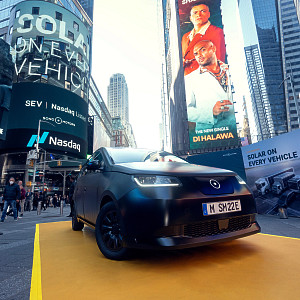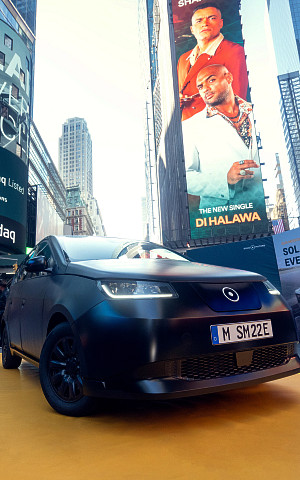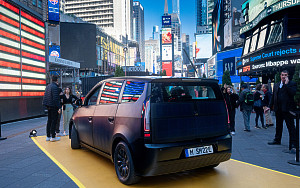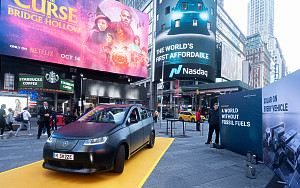Sion, which Sono Motors believes will be the world’s first affordable solar electric vehicle (SEV) showcased at Times Square in New York, kicking off a three-week cross-country tour including stops in Boston, Detroit, San Francisco Bay Area, and Los Angeles
Sono Motors has received more than 42,000 reservations and pre-orders for Sion to date; Sion is expected to retail in Europe for approximately €25,000 ($25,000) with start of production planned for the second half of 2023
Integrated solar panels can extend Sion’s range and reduce charging frequency
NEW YORK, 11 October 2022 – Sono Motors (NASDAQ: SEV), the Munich, Germany-based company pioneering solar mobility, today kicked off its “Celebrate the Change” U.S. tour in New York City with the debut of its solar electric vehicle (SEV), Sion, at Times Square. Sono Motors believes that the 5-seater passenger vehicle, which is expected to retail in Europe for approximately €25,000 ($25,000), has the potential to become the world’s first affordable SEV. Start of production for the Sion is planned for the second half of 2023.
“With the impacts of climate change already being felt around the world, the need to decarbonize has never been more urgent. A world without fossil fuels demands cleaner transportation and our mission to add solar to every vehicle is the next logical step,” said Laurin Hahn, co-founder and CEO of Sono Motors. “Solar electric vehicles represent a new frontier in zero-emission mobility, enabling convenience, more range on a single charge, and greater independence from charging infrastructure. We are tremendously excited to bring Sion to the United States for the first time and to showcase our vision of the future of solar transportation.”
Sion will embark on a multi-city coast-to-coast tour, including planned stops with public viewing in:
- New York City (October 11, NASDAQ MarketSite at Times Square; October 12, 1 Noble Street, Brooklyn)
- Boston (October 14, High Street Place Food Hall)
- Detroit (October 17, The Eastern)
- San Francisco (October 24-25, location TBA)
- San Jose (October 26, by invitation only)
- Los Angeles (October 27-28, Tuxedo LA)
“The U.S. continues to be an exciting market for us and in addition to our plans to begin delivering Sion to the European market next year, we are actively evaluating American partnership opportunities while expanding our portfolio of integrated solar solutions for fleet operators. Our solar solutions are intended to enable trucks, buses, trailers, and other commercial vehicles to harness the power of the sun to reduce fossil fuel usage and costs without compromising on range — or anything else. Companies across Europe and the United States are already using or piloting our licensable technology on their fleet vehicles and we’re eager to help even more American fleet operators,” Hahn added.
To learn more about Sono Motors’ tour in the United States, please visit sonomotors.com/en/celebrate-the-change
Sono Motors: Harnessing the power of the sun
Since its founding in Munich, Germany in 2016, Sono Motors has become a pioneer in solar-powered transportation. Its development of Sion, which has the potential to become the world’s first affordable SEV, coupled with Sono Motors’ portfolio of integrated solar technologies, empower everyday commuters as well as businesses to harness the power of the sun for mobility.
The outer shell of the family-friendly Sion consists of 456 seamlessly integrated solar half-cells that extend the time between charges and enable self-sufficiency on short journeys. Its solar technology extends Sion’s estimated 190 mile battery range by an average of 70 miles per week in typical weather conditions and by as much as 150 miles per week in optimal conditions. Sion’s 54 kWh LFP battery will allow for a maximum charging capacity of up to 75 kW (DC) and 11 kW (AC). Bidirectional charging up to 11 kW will turn Sion into a solar “power plant” that can charge devices, other EVs, or put energy back into private or public energy grids.
To date, Sion has received more than 20,000 active private reservations (with an average down payment of about $2,000) as well as more than 22,000 pre-orders from fleet operators, including more than 12,000 from FINN, a subscription car service that operates in Germany and the U.S. With an expected retail price tag of approximately $25,000 — and a reduced need to plug-in to charge — the Sion is expected to have among the lowest total cost of ownership in the medium-size passenger vehicle category. In partnership with Valmet Automotive, Sono Motors plans to start production in Finland in the second half of 2023 and aims to produce approximately 257,000 Sion vehicles within seven years.
Sono Motors recently unveiled its Solar Bus Kit, an efficient solar retrofit solution optimized for 40-foot public buses commonly used in Europe. It is designed to allow electrical subsystems like HVAC, heating, ventilation, automatic doors, and video screens to be partially powered by solar energy, and can save up to 400 gallons of diesel and up to 4.4 short tons of CO2 per bus per year.
More than 20 companies worldwide are already piloting Sono Motors’ integrated solar technology – including a subsidiary of Mitsubishi Europe, MAN Truck & Bus, CHEREAU, Kögel, and the Munich municipal bus system – on a variety of fleet vehicles such as buses, trailers, trucks, and electric transporters. Several of these customer deployments debuted for the first time in September at IAA Transportation 2022, the world’s largest transportation event dedicated to commercial vehicles.
Sono Motors also underscored its partnership with Sibros, a San Jose, California-based pioneer of Deep Over-the-Air (OTA) Connected Vehicle Systems. Sibros works with global automakers to optimize fleet health, reduce software recalls, and create new connected services with full vehicle OTA software updates, data collection, and diagnostics in a single system. Sion’s software updates, data collection, and remote interactions will be handled by the Sibros Deep Connected Platform, giving Sono Motors direct insight into vehicle data and fleet analytics and the ability to reduce maintenance and service costs, while also diagnosing and fixing potential problems before they compromise vehicle capabilities, including malware hacks and other cybersecurity issues.
“We are proud to have been selected by Sono Motors, which we believe to be one of the most innovative global leaders in the solar-powered vehicle market, to provide our connected vehicle technology to the impressive Sion,” said Hemant Sikaria, CEO and co-founder of Sibros. “The popularity and pre-orders of the Sion has emphasized the need for safe, secure and reliable over-the-air software updates and data collection for the entire vehicle fleet. Innovative technologies such as solar-powered vehicles are the future and we’re excited to partner with Sono Motors for the ride.”
FORWARD-LOOKING STATEMENTS
This press release includes forward-looking statements. The words "expect", "anticipate", "intends", "plan", "estimate", "aim", "forecast", "project", "target", “will” and similar expressions (or their negative) identify certain of these forward-looking statements. These forward-looking statements are statements regarding the Company's intentions, beliefs, or current expectations. Forward-looking statements involve inherent known and unknown risks, uncertainties, and contingencies because they relate to events and depend on circumstances that may or may not occur in the future and may cause the actual results, performance, or achievements of the Company to be materially different from those expressed or implied by such forward looking statements. These risks, uncertainties and assumptions include, but are not limited to (i) the impact of the global COVID-19 pandemic on the global economy, our industry and markets as well as our business, (ii) risks related to our limited operating history, the rollout of our business and the timing of expected business milestones including our ability to complete the engineering of our vehicles and start of production on time and budget and risks related to future results of operation, (iii) risks related to our unproven ability to develop and produce vehicles and with expected or advertised specifications including range, and risks relating to required funding, (iv) risks related to our ability to monetize our solar technology, (v) risks relating to the uncertainty of the projected financial information with respect to our business including the conversion of reservations into binding orders, (vi) effects of competition and the pace and depth of electric vehicle adoption generally and our vehicles in particular on our future business and (vii) changes in regulatory requirements, governmental incentives and fuel and energy prices. For additional information concerning some of the risks, uncertainties and assumptions that could affect our forward-looking statements, please refer to the Company’s filings with the U.S. Securities and Exchange Commission (“SEC”), which are accessible on the SEC’s website at www.sec.gov and on our website at ir.sonomotors.com. Many of these risks and uncertainties relate to factors that are beyond the Company's ability to control or estimate precisely, such as the actions of regulators and other factors. Readers should therefore not place undue reliance on these statements, particularly not in connection with any contract or investment decision. Except as required by law, the company assumes no obligation to update any such forward-looking statements.
Sono Group N.V. (OTCQB: SEVCF) is on a pioneering mission to accelerate the revolution of mobility by making every vehicle solar. Sono Motors’ disruptive solar technology has been engineered to be seamlessly integrated into a variety of vehicle architectures — including third-party OEM cars, buses, refrigerated vehicles, and recreational vehicles — to extend range and reduce fuel costs as well as the impact of CO2 emissions, paving the way for climate-friendly mobility.
